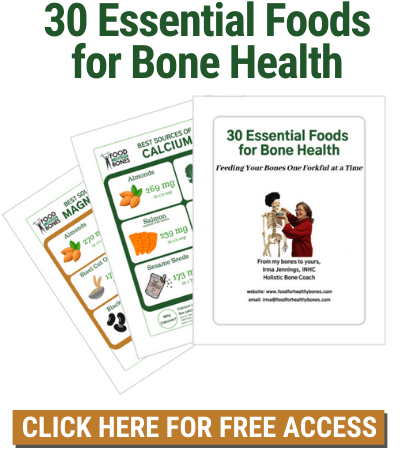Your Bones: Why Eating the Whole Food Matters
By guest blogger: Margie King, Nourishing Menopause
What makes an apple good for us? Is it the Vitamin C? Vitamin K or B6? Is it the soluble fiber or the insoluble fiber? Is it the potassium or the phytosterols?
Or is it the apple? What a concept.
Western science is obsessed with deconstructing food, researching and analyzing its component parts, isolating the "active ingredients", repackaging them in pills or powders and prescribing them in daily doses. But according to Annmarie Colbin, PhD., author of Food and Healing, this chemistry-based theory of nutrition is completely upside down.
Dr. Colbin, founder and CEO of the Natural Gourmet Institute for Health and Culinary Arts, has crafted her own nutrition theory based on more than 30 years of nutrition practice and teaching. She prefers to liken nutrition to systems theory, and believes that a whole food, like the human being consuming it, is complex and much greater than the sum of its parts.
"Whole foods" according to Dr. Colbin are those "foods that nature provides and all the edible parts." She limits them to foods that have one ingredient, such as plants, whole grains, beans, vegetables, fruits, nuts and seeds.
Animal foods are a little tricky to identify. Eggs are a whole food, but steaks are not unless you're eating the whole cow. She includes small fish if you eat the head and bones, and small birds like quail. Whole milk is included but low-fat dairy is not
Why does eating the whole food matter?
Dr. Colbin's theory is that our bodies know the difference between a whole food and an aggregation of isolated nutrients. The human body has evolved over thousand of years to eat the food that nature presents to it and if that food has been split apart or "fragmented", the body knows and goes looking for the missing parts.
For example, Dr. Colbin suggests that if you eat fragmented wheat like white bread, where the bran and the germ have been removed, your body will still be hungry and seek the missing part of the food, i.e., something with fiber or crunch. Likewise, health nuts who devour wheat germ or wheat bran in isolation will also feel something is missing and may find themselves craving refined flour in the form of cake at night.
Whole foods help control cravings
When we eat only part of a food that has been "fragmented" i.e., broken down into it's component parts, our bodies know and want what's been missing. This can set us up for cravings according to Dr. Colbin.
She cites table sugar as an example. It is a fragmented food taken from the whole food, sugar cane. So little of the sugar cane makes it to the final product that Dr. Colbin calculates it takes 17 feet of sugar cane to make one cup of sugar. What's missing is mostly the water content found in natural sugar cane, and the results she says, is that sugar makes you thirsty. If you drink sodas, which have 12 teaspoons of sugar in a serving, you'll be thirsty afterwards and continue to drink more, creating a vicious cycle.
Why health nuts might crave junk food
In fact, this problem can affect people who are trying to be healthy just as much as people who are eating junk food. For instance Dr. Colbin warns to be very careful of vitamins and mineral supplements. Although they may have a place at certain times to treat a condition or deficiency, they are also a fragmented food. The body, she says, may have a difficulty processing these isolated nutrients outside of whole food.
Dr. Colbin suggests that supplements may even make you less likely to want to eat vegetables and set you up for junk food cravings to balance out too many vitamins and minerals. Her advice is to use vitamins and supplements if medically required, but not every day and not forever.
It's all about maintaining the natural balance in the foods that nature provides. And there's no need to worry about striving for perfection or changing your diet radically. Dr. Colbin recommends that you aim for 70% whole foods in your diet to keep everything in balance. Start small, make a few changes, listen to your body and see if you notice the difference.
 Margie King is a holistic health coach and graduate of the Institute for Integrative Nutrition ® Wharton M.B.A. and practicing corporate attorney for 20 years, Margie left the world of business to pursue her passion for all things nutritious. She now works with midwife women and busy professionals to improve their health, energy and happiness through individual and group coaching, as well as webinars, workshops and cooking classes. She is also a profession copywriter and prolific health and nutrition writer whose work appears as the National Nutrition Examiner and as a guest blogger on GreenMedInfo.com. To contact Margie, visit www.NourishingMenopause.com
Margie King is a holistic health coach and graduate of the Institute for Integrative Nutrition ® Wharton M.B.A. and practicing corporate attorney for 20 years, Margie left the world of business to pursue her passion for all things nutritious. She now works with midwife women and busy professionals to improve their health, energy and happiness through individual and group coaching, as well as webinars, workshops and cooking classes. She is also a profession copywriter and prolific health and nutrition writer whose work appears as the National Nutrition Examiner and as a guest blogger on GreenMedInfo.com. To contact Margie, visit www.NourishingMenopause.com
Disclaimer: This article is not intended to provide medical advice, diagnose or treatment.
--------------
Irma
questions??? [email protected]
As always, thank you for sharing my e-newsletter with your friends /family and Facebook by using the easy share links below. That's how we grow!
And feel free to leave a comment.
Let Me Support Your Bones
Get Customized In-Depth Private Session
Book a Private Coaching with Irma Now
Join Our Amazing Bone Tribe Community
Get the support & information you need to live fearlessly with your bones diagnosis
From my bones to yours,
Irma Jennings, INHC
Your Holistic Bone Coach
[email protected]

